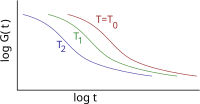
Photo from wikipedia
Abstract A phenomenological analysis for predicting the long-term creep life of high temperature materials at different temperatures using model parameters derived from short-term creep tests is presented. The model invokes… Click to show full abstract
Abstract A phenomenological analysis for predicting the long-term creep life of high temperature materials at different temperatures using model parameters derived from short-term creep tests is presented. The model invokes Maxwell-Boltzmann temperature dependence, as rigorously developed in a recent analysis pertaining to the power law domain and a modified form of the Monkman-Grant hypothesis for isothermal conditions. In addition, the model provides, by pattern recognition, suitable weighting factors for the role of strain rate and temperature. The result is a material-dependent analysis which uses only short-term creep test data but is able to predict accurately both the short- and long-term creep behaviour of several complex creep-resistant alloys. This analysis is validated using reliable and accurate creep data taken from NIMS (National Institute of Materials Science, Japan) database pertaining to 10 industrial, high temperature alloys. The consistency or otherwise of the predictions is examined and the importance of the weighting factors in ensuring accurate predictions is emphasized.
Journal Title: International Journal of Mechanical Sciences
Year Published: 2021
Link to full text (if available)
Share on Social Media: Sign Up to like & get
recommendations!